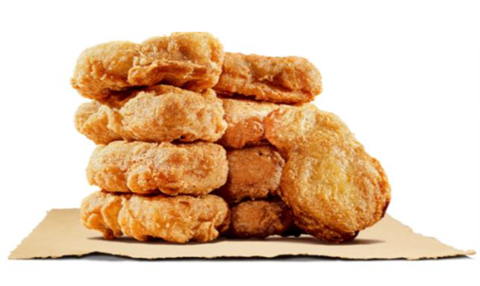Burger King has unveiled Vegan Nuggets as part of its product portfolio for 2022, prompting industry organisations to suggest there should be a greater focus on the provenance and seasonality of all food.

The Burger King UK (BKUK) new Vegan Nuggets are made from soy and plant proteins and are endorsed by the Vegan Society.
As part of its PR launch the company said the product’s introduction “demonstrates positive progress” towards its target to offer a 50% meat-free menu by 2030. The target is part of BKUK’s sustainability charter, Burger King for Good. According to the company, it claims this pledge will help BKUK achieve “a 41% reduction in greenhouse gas emissions by 2030.”
Alasdair Murdoch, CEO at BKUK said that the product launch was part of the company’s commitment to helping customers “make good decisions about what they eat and drink and providing them with informed choices – whether through clear nutrition and allergen labelling, or by offering vegan and vegetarian options.”
He continued: “The launch is another positive step in reducing our carbon footprint and driving innovation in our menus in response to growing demand for meatless alternatives and products with no animal protein in the UK.”
Not the full picture
Adele Jones, deputy CEO of the Sustainable Food Trust, said: “We welcome Burger King’s commitment to reducing their environmental impact and fully support their decision to address the over-consumption of intensively produced chicken. However, it must be noted that not all meat is part of the problem - livestock products produced in a low input, outdoor or pastured system can even be part of the climate solution. Our preference therefore would be a commitment to improving the provenance and transparency of all their food products - both plant and meat based.”
A word of caution
Tony Goodger, a spokesperson for the Association of Independent Meat Suppliers (AIMS), issued a word of caution on the BKUK's vegan range and its suitability for vegan consumers. He said: "It is of note that if you are eating either of the vegan lines that are served within a bun that they carry the following disclaimer, ‘May Contain: Milk, Eggs’; so there is no guarantee that you are buying a fully vegan product.
"As regards the nuggets, no doubt consumers wishing to eat the product will want it with a dip or dips." Goodger said that, as of yet, "there is no claim as to whether BK’s dips are suitable for vegans.
"If you are a vegan and considering making a purchase, I believe it is very much a case of ‘buyer beware’."
"Black and white thinking"
In response to the annual Veganuary initiative, John Pallagi, CEO and founder of online meat retailer Farmison & Co, has urged customers to “put eating seasonally ahead of the usual new-year marketing hype pushing plant-based alternatives.” Writing in his January blog, Pallagi warned that Veganuary could have the opposite effect to the one intended by its proponents – pushing out much more sustainable ways of eating, in the pursuit of “black and white thinking” and “simplistic narratives” on diet.
He said: “The perseverance of the narrative that a plant-based diet is a magic bullet for the climate crisis is worrying. Vegan cookbooks full of almond and avocado recipes are a case in point and to me are far removed from the chilly landscape of Yorkshire.”
Farmison & Co’s founder has also called for consideration of a UFL – an Unseasonal Food Levy – to help change the ‘everything all-the-time’ mindset and guide customers into lower-cost, lower-impact eating.
Pallagi said: “The idea of consuming foods grown thousands of miles away, often in a chemically intensive and water intensive manner, in the name of sustainability is beyond satire and undermines the very concept of our seasons.
“Not only does eating seasonally mean produce tastes better, but it’s also far more sustainable - keeping food miles low, reducing waste and supporting local farmers.”
As part of its Save Our Seasons (SOS) campaign, Farmison has produced an online seasonal food guide that aims to help educate customers as to “the right food at the right time.”
This story was originally published on a previous version of the Meat Management website and so there may be some missing images and formatting issues.












